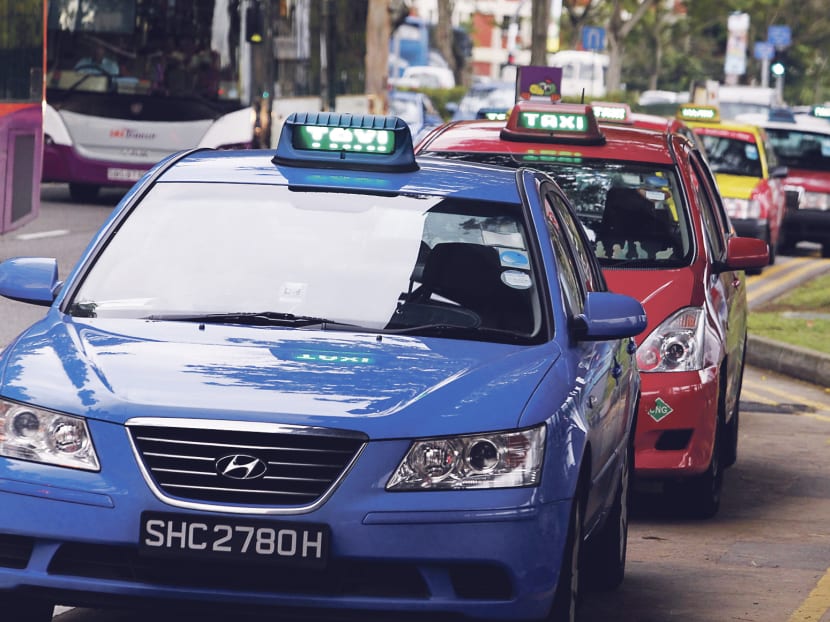Dynamic-pricing option for taxi operators approved
SINGAPORE — Paving the way for a sea change in how demand for taxis will be met during peak hours, the Public Transport Council (PTC) and Land Transport Authority (LTA) on Friday (March 17) gave several traditional taxi operators the green light to implement dynamic pricing — or surge pricing — for trips booked through mobile applications.
SINGAPORE — Paving the way for a sea change in how demand for taxis will be met during peak hours, the Public Transport Council (PTC) and Land Transport Authority (LTA) on Friday (March 17) gave several traditional taxi operators the green light to implement dynamic pricing — or surge pricing — for trips booked through mobile applications.
“We have no objections to the proposals,” said PTC and LTA in a joint statement. Shortly after the announcement, it was confirmed that Grab will be working with five operators — SMRT Taxis, Prime Taxi, Premier Taxis, Trans-Cab and HDT Singapore Taxi — to roll out a new service. Called JustGrab, commuters using this service will be informed of their fare prior to the start of the journey. The fares are calculated based on travel time, distance, booking fees and real-time demand and supply for taxis, said Grab and SMRT Taxis in a news release. More details of the new service will be announced on Wednesday.
This means that fares could dip during off-peak hours and soar during periods of high demand.
Observers noted that the latest developments, which came weeks after the operators submitted their proposals to the PTC, are a nod to the explosive growth of private hire car services, and the viability of the surge-pricing model: Despite initial bad press, commuters have shown they are willing to pay more during periods of high demand, to secure a booking.
In November 2015, for example, fares charged by private hire car service Uber spiked by almost four times the usual fare during a morning rush hour train disruption on the North-South Line.
Nevertheless, the new pricing structure also means cheaper fares when demand is low — as compared with the peak period surcharges that apply regardless of real-time demand and supply.
Writing on Facebook earlier this month, Second Transport Minister Ng Chee Meng noted that some commuters “may be uncomfortable” with the taxi companies’ plans to introduce new pricing structures.
But he stressed that dynamic pricing will be an added option, and commuters will still be able to pay metered fares when they book taxis, and flag-down rides will not be affected.
Unlike its rivals, ComfortDelGro — which owns the largest fleet of taxis here — is not jumping on the bandwagon. Group corporate communications officer Tammy Tan said that the operator would be introducing a flat-fare structure similar to metered taxi fares for trips booked via their in-house mobile application in two to three weeks’ time.
Prime Group chairman Neo Nam Heng told TODAY that the company was initially targeting a launch date of April 1, but now that approval has been granted, the timeline has been shifted to “as soon as possible”.
HDT’s managing director James Ng said that the service would likely be rolled out “in tandem” with various operators, and the company has been engaging in dialogues with their drivers.
Grab will take a 10-per-cent cut for each ride under the new service.
Ahead of the launch, Grab has been training drivers on the new service, through talks, demonstrations and even a quiz.
Singapore is the only country in which Grab has tied up with operators. In its other markets, the company works with cabbies directly.
GrabTaxi Singapore head Melvin Vu said that the company has been discussing the implementation of the new fare structure with the authorities since December.
“The current taxi fare model does not account for real-time passenger demand and driver supply, which often means that passengers pay a surcharge even when there are many available taxis within the vicinity,” said Mr Vu.
Such a pricing strategy ensures that taxis are better utilised throughout the day, and passengers take “more affordable” rides based on real-time market demand, he explained.
SMRT Taxis and Private Hire Services managing director Tony Heng added that the tie-up with Grab would allow the pricing of services to be competitive, and cater to the different needs and preferences of customers.
In a statement, the National Taxi Association (NTA) said that the new service offered more options for cabbies and commuters, and helped to “level the playing field” for taxi drivers.
In recent months, a series of measures has been taken to help the taxi industry cope with the disruption brought on by Grab and Uber.
For example, under the taxi availability framework, requirements for cabs to clock a minimum daily mileage and to ply the roads during peak shoulder hours were abolished from January.










